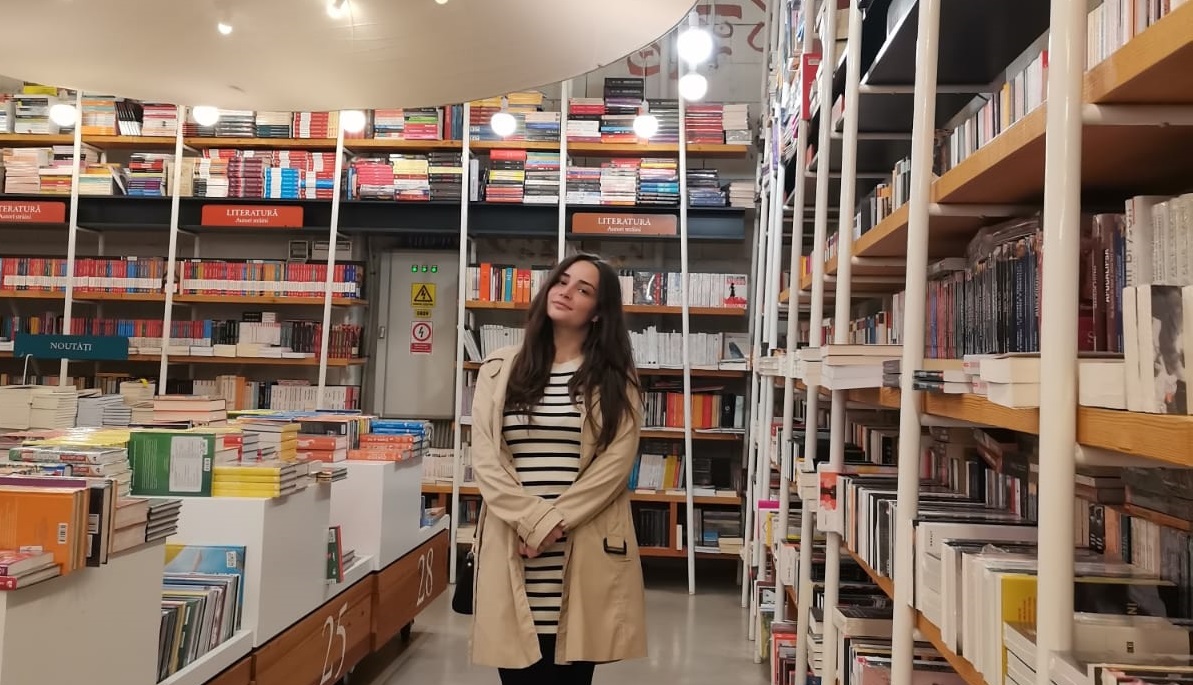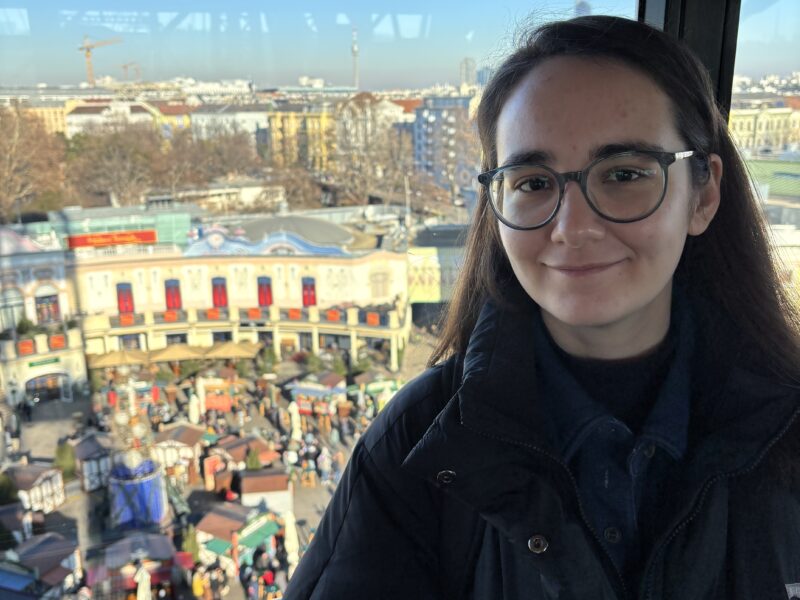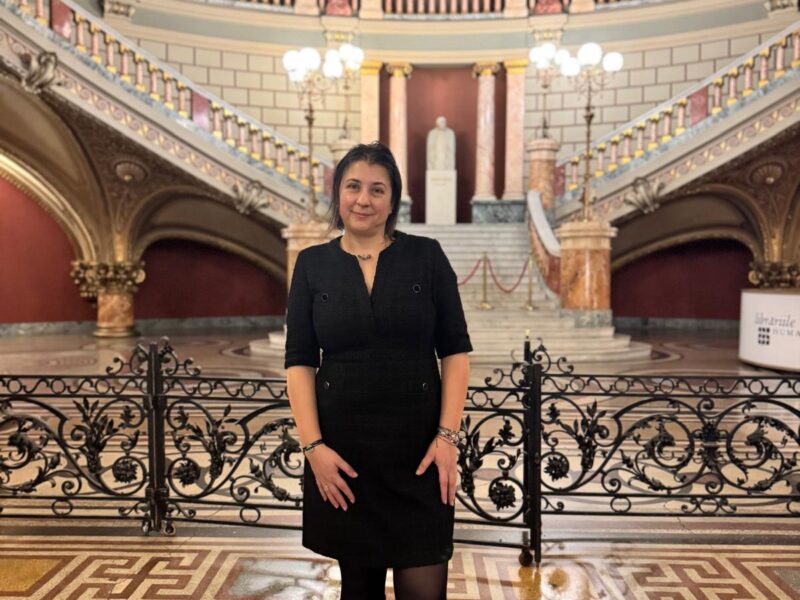Ruxandra Georgescu coordinates the promotion and communication department of Corint Publishing House. She joined the team in 2022 as an editor and then became a PR specialist. But her journey in the book industry starts in 2017. She first worked as a bookseller at Humanitas Cișmigiu bookstore, then as Social Media Coordinator at Humanitas Bookstores, later taking over the PR and Marketing department of the same bookstore chain. She graduated from the Faculty of Letters, where she also completed a Master's degree in Romanian literary studies. Ruxandra is an avid reader and seems to know the magic formula for each book to find its perfect readers.
Which books have made you a reader?
What a question! I don't even know, I can only guess: Matilda, which I can happily still see at the top of the little readers' charts, and Heidi the Mountain Girl, perhaps, as it was the book I got after my first first-grade class party, which I read the same day and has stayed with me ever since.
What was the moment you knew you wanted to become a professional reader, meaning reading could provide you with a living?
I think the moment is linked to the happy coincidence that brought me to the Humanitas Cișmigiu bookstore, where I met many wonderful people & passionate readers.
You entered the publishing world as a bookseller at the Humanitas Cișmigiu. How did you end up working there and what were your working days like?
As I said, I think it was a happy occurrence. I saw a job advertisement for libhumanitas.ro. I went for an interview and realized that there was no way I would be able to combine a fixed schedule with my master's degree, which I had just started, but then I found out that there was a need for a "bookseller" at the Humanitas Cișmigiu, and on November 10, 2017 I was there. No two days were alike, which I loved dearly! Whether it was a day with two or three book launches, the new books we received daily or "just" more complex interactions with readers, there were always beautiful things happening around us. Plus, we were (again) lucky enough to have a team of dedicated people from whom we learned a lot (thank you!).
Do you have any funny (or sad, perhaps) memories from your two years at the bookstore?
Funny yes, of course. I remember how I managed to get to the bookstore in 11 minutes, the alarm had played tricks on me one morning. Another time, a little boy said to me, "When I grow up I want to be a reader!"
I don't remember having much trouble; perhaps just a little disappointment with those who considered us "salesmen" or with fellow members of the guild who considered us the last - and least important, nothing more untrue! - link in a chain. We have learned, in the meantime, that most of it is the bugbear of the system in which we work, where you have to juggle so many things almost every day - books and whims...
You were then Social Media Coordinator at Humanitas Bookstores. How did you make this transition and what did the job entail?
Life itself made the transition, unfortunately, because like most booksellers, you have to make a living from something else. I created a bookstore Instagram page, librarlacismigiu, which has since died out, thanks to the Meta algorithm; photography was, and still is, a means of expression that I use fondly when my words take a break. The job involved managing the Social Media accounts of all the bookstores, as well as various partnerships in this area. It was the stage where I got to know my colleagues who I didn't get to talk to much while I was at the bookstore & I thank them in this way for our beautiful projects.
After Social Media, you ended up managing the PR and Marketing department of Humanitas Bookstores for three years. What did this change mean in terms of responsibilities?
Indeed, it had been three eventful years with people who have stayed with me to this day and to whom I am grateful. In addition to Social Media, the new job involved managing and monitoring PR & Marketing activities in the bookstores; very different spaces, in fact, which required different strategies and promotion projects.
What were the best events or campaigns you worked on during those three years?
My favourite ones are now the campaigns celebrating our bookshops, and the campaign before the winter holidays, when colleagues sent me pictures of the new decorations in their favourite places on Whatsapp.
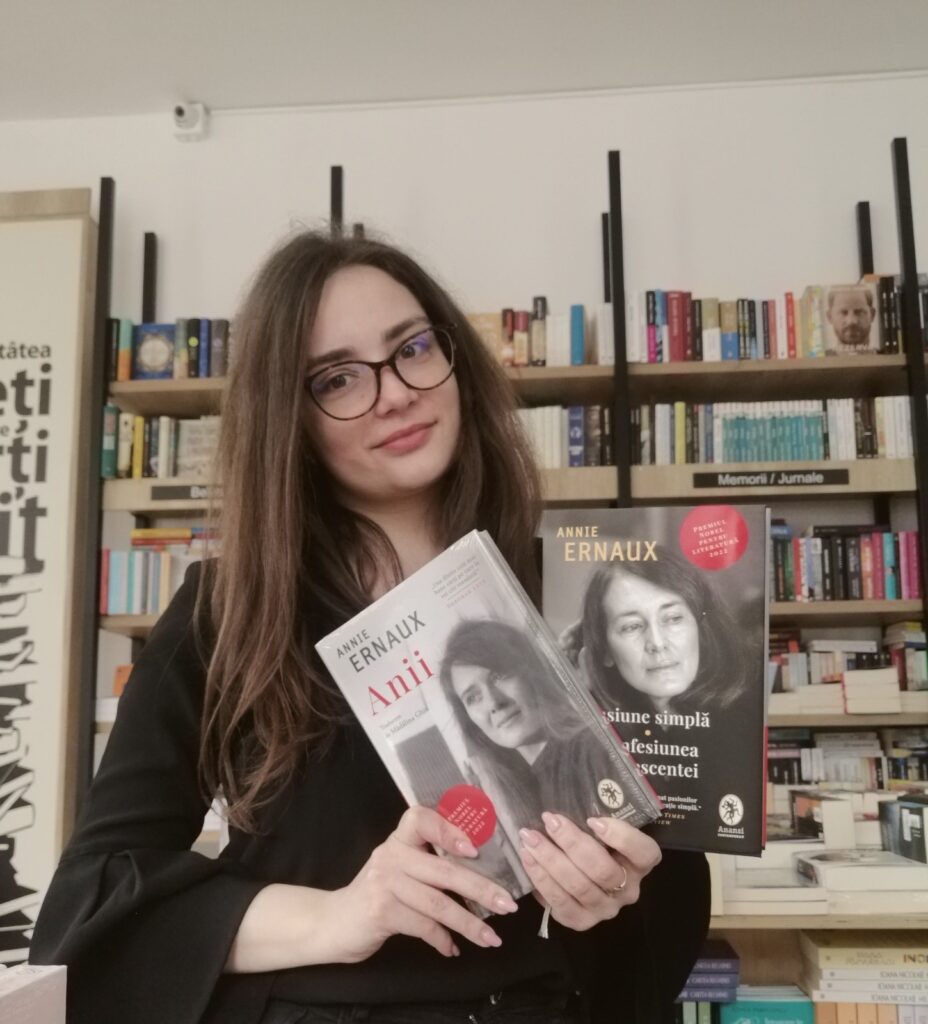
I imagine you were in touch with people of most publishers . What did these collaborations actually consist of?
Indeed, we were in contact with the publishers regarding events, and the discussions started from both sides: on the one hand there were our proposals regarding book launches, on the other hand the intersection with their promotion plans, public readings, launches, children's shows, workshops, etc.
Just as display space in a bookstore is limited, so too is promotional space. How were collaborations with publishers or bookshop partners negotiated and what were the criteria for implementing proposals from one partner or another?
You're quite right, the possibilities for implementing collaborations were limited, unfortunately, but we always tried to extend partnerships to the whole chain of bookshops. The criteria were primarily related to the titles that the publishers wanted to promote in a given period, and then to the sales in that space, in order to activate the best spaces in each bookstore. Then, if we were talking about a Romanian author, we wanted to make the book known in the author's home town, if possible; if not, we sought to facilitate as many meetings with the public as possible, in whatever form.
What have been your greatest satisfactions and challenges during your years as PR and Marketing Coordinator at Humanitas Bookstores?
Among the satisfactions I would mention the people I met, first and foremost, and from whom I had so much to learn, who I hope will forgive my idealism and the "crazy beginning". Then, challenging indeed were the situations from whose rigidity one could not get out, my little egos and my sadness along with them. Lessons, though.
From October 2022 you changed editorial field, working as an editor at Corint Junior. Why did you make this switch and how did you get the job at Corint?
It was a time when I wanted to be a bit closer to the text and a bit further away from the hustle and bustle of promotion and the noise of book launches. Plus, I was curious to see how things worked "on the other side" and wanted to retrace the book's path from the first round of copy editing to publication for once. It was a time when I realised and began to infinitely admire the work of the collection coordinators, editors, typesetters and everyone else who charts that path for each individual book.
What does your working day look like now that you're back on the promotion barricades?
After the time I was telling you about, my working day is now divided between promoting the image of Corint Publishing and the occasional promotion of titles in our collections. The autumn releases have already started to arrive at the publishing house, the books are in various fields (history, fiction, children's books or those in the educational field), so all the departments of the publishing house are involved in the promotion plans, as well as my colleagues from PR & Marketing, the team that creates and maintains this image day after day.
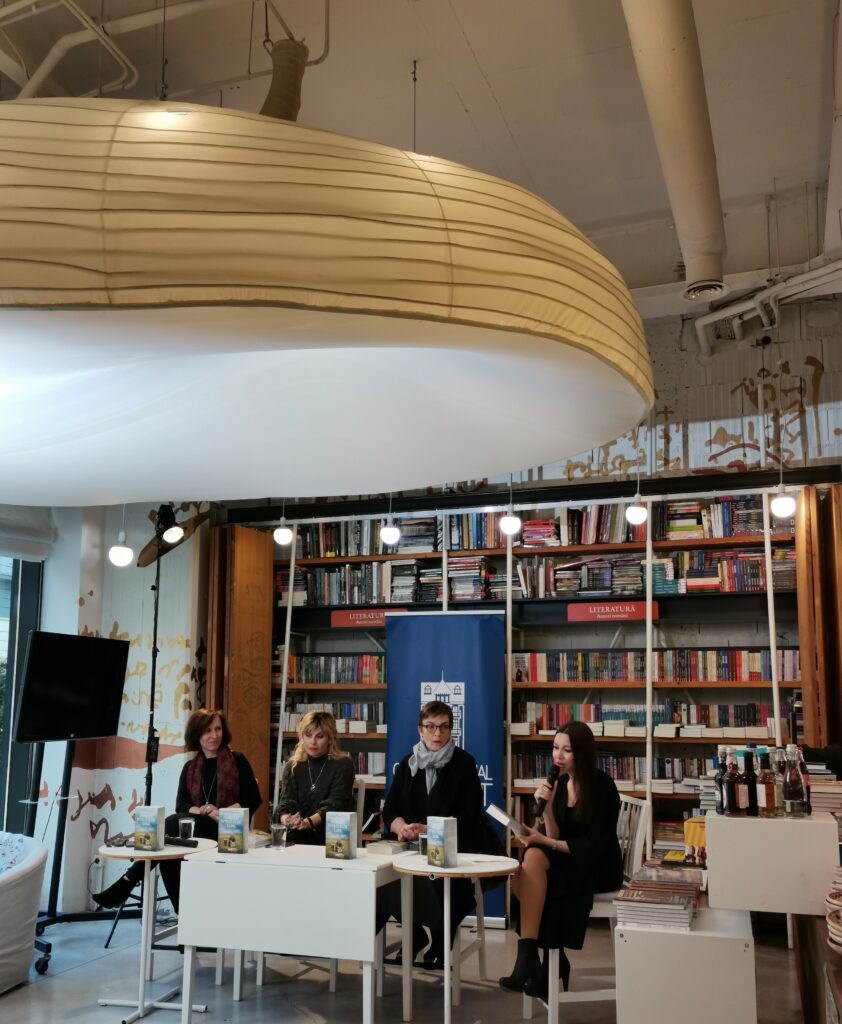
Beyond the actual object of the work (the book as the keeper of a story versus the actual text of the story), what are the biggest differences between working in a bookstore and working in an editorial office? Perhaps in terms of team, pace, organisational culture.
The differences are big right from the start; the editorial office brings the book into the world, which only then enters the distribution chain and starts to be promoted. So if we have the book in the centre, on the left would be the editorial path, on the right the promotion path. They are two sides of the same coin, which complement each other and which I think fulfil their mission when nothing is about them anymore and everything is about the reader and the way they receive the book.
Many of the people I've spoken to here have told me that the ability of drafting and working on text is stolen from others or learned by working. How did you pick up the know-how of the craft and maybe some specific tips&tricks?
I don't think I've mastered the know-how, but it's been a time of seeing what it's like to read differently, what a "surgical" read is like, what the stages of a book reaching the shelves of a bookshop are, roughly speaking, and what a great victory that is every time. And yes, I now read any text much more carefully & know better where a sentence "creaks".
How much have the skills you've learnt at the Faculty of Letters helped you in the jobs you've had so far?
All the readings in college have contributed to a personal way, as of now, of reading a text, relating to it, understanding its logic and coherence. Yes, that's what I think the faculty gives you, more than anything else: tools that then help you relate to a certain way of being that texts acquire in the world.
You already have six years of experience in the book industry. What do you think are the most important qualities or skills needed to advance in this field?
I’m starting school in November, so! There's still a lot to learn, read and experience (I hope!), but I think the most important things you need to have in mind to stay in the field (I don't know how much advancement we can talk about, I, for one, like to think we're just refining our way of doing things and understanding the publishing system better) are curiosity, an (almost schizoid, at times) sort of adaptability to the outside, boundless hope, and a bit of empathy to keep you from any kind of end (as a reader, a publisher & beyond).
You moderated the first meeting of the book club organised by Casa Burgheză. You talked about Chekhov. What would the ideal book club look like if the guests included writers and artists of yesterday and today? And what book would you talk about? And what music would you listen to during the breaks?
Yes, last season at Casa Burgheză was a joy. I've met people from extremely diverse fields who read "classic" literature like I never would have thought! It was an exercise that helped me see what it's like to be a different kind of reader. If we have advertising space, I encourage you to go to the events at Casa Burgheză. There's plenty to see, talk about and read!
[Photos are part of Ruxandra Georgescu's archive.] [Translated into English by Oana Dragomir.]

